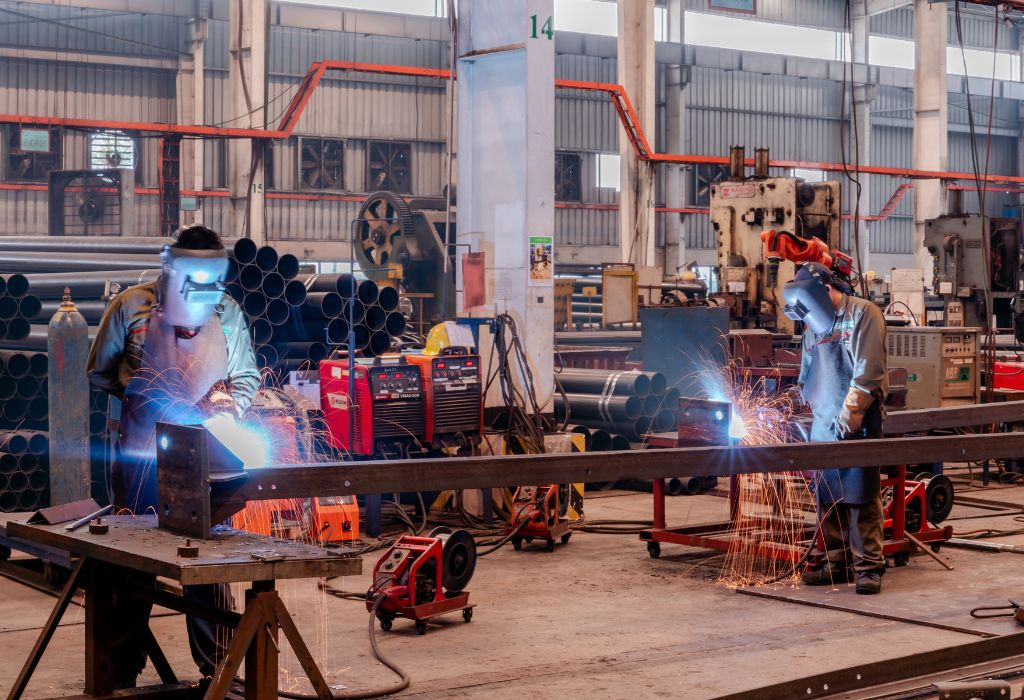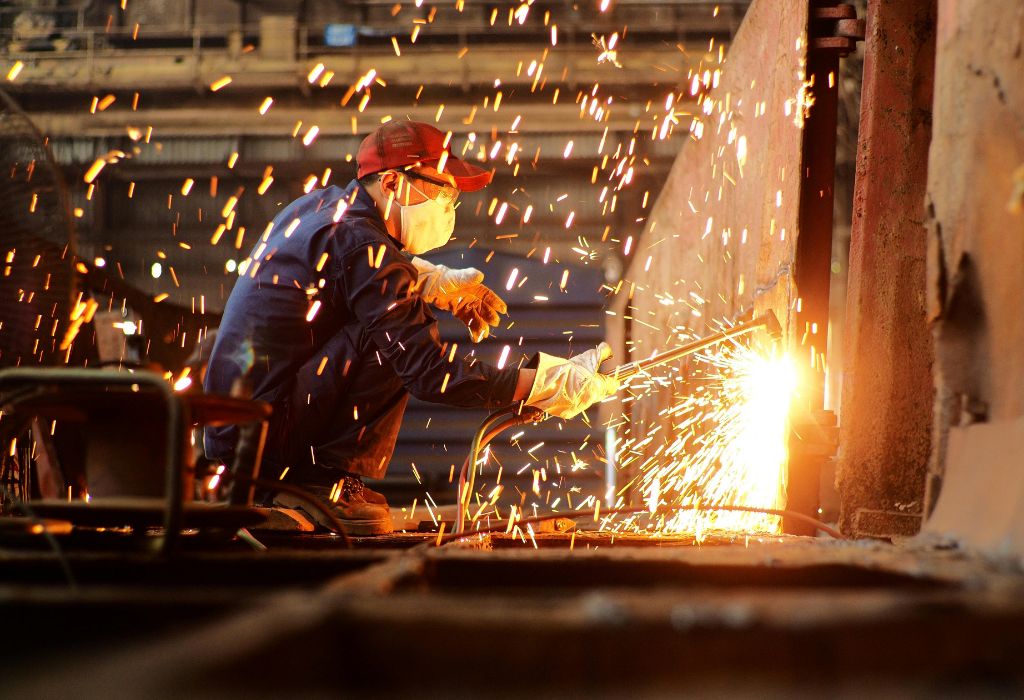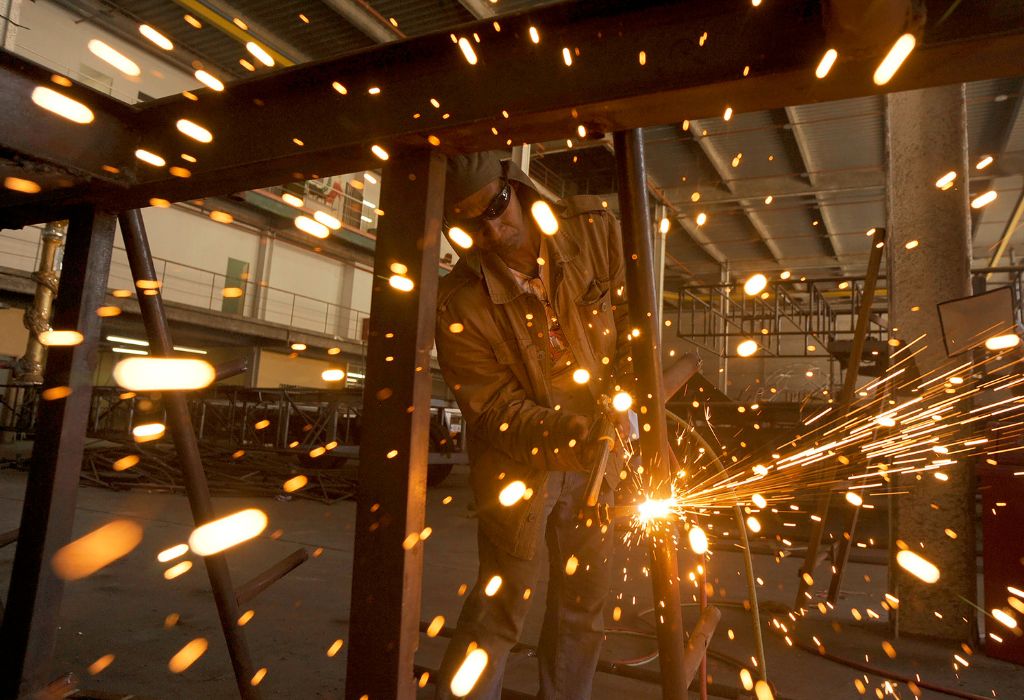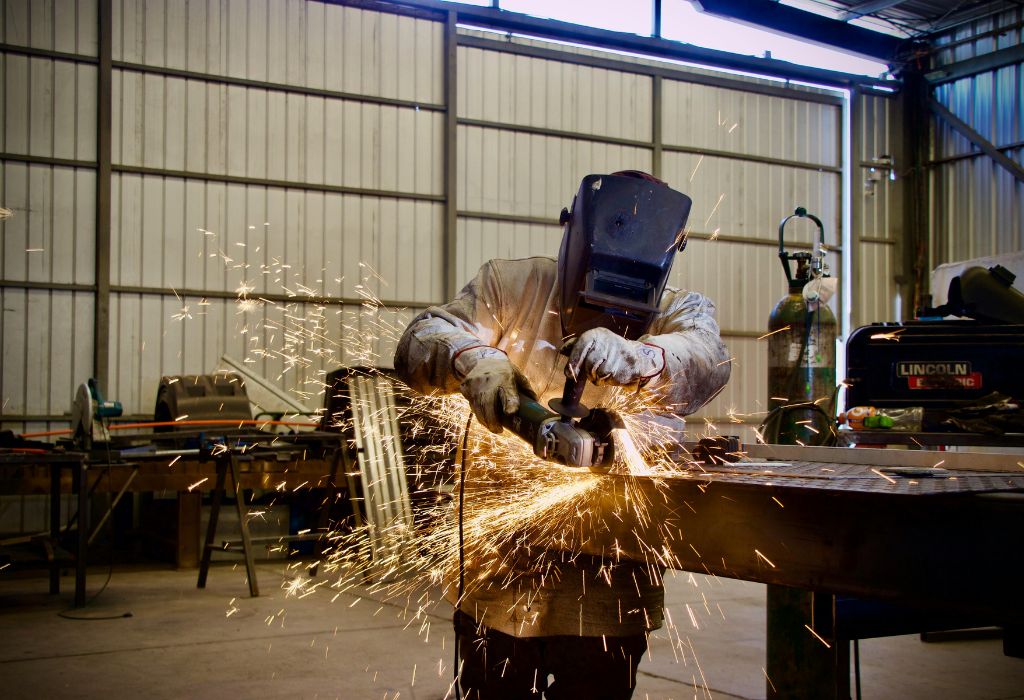A welder stands before glowing metal, sparks flying in every direction. Yet the same question keeps coming back: how much does a welder make in reality?
Many people start welding with uncertainty about their earning potential. Others want to know if this trade can offer a strong financial future compared to other careers.
One report from the U.S. Bureau of Labor Statistics shows the median annual wage for welders was $51,000 as of May 2024 (bls.gov).
Another source reveals the average hourly rate for welders in late 2025 was around $23.62, based on thousands of salaries shared by employers (indeed.com).
What makes this topic even more interesting is how pay changes based on state, industry, and experience level. A beginner might start with modest wages, while certified specialists can earn two or three times more.
This creates curiosity and shows why understanding welding salaries matters for anyone thinking about this career.
In the sections ahead, you will discover how earnings vary by location, skill set, and industry demand. You will also see how the right certifications and career choices can boost a welder’s income significantly.
Understanding Welder Salaries: How Much Does a Welder Make?

Welding salaries depend on many factors, from experience to industry demand. Understanding these factors helps readers see how their income can grow over time.
The U.S. Bureau of Labor Statistics reported a median annual pay of $51,000 for welders in 2024 (BLS). This figure combines entry-level wages with the higher salaries of experienced professionals.
Hourly wages are common across most welding jobs. They typically range from $17–$35 per hour, depending on certifications, location, and job type.
Overtime pay can significantly increase total income. Many welders earn extra money through night shifts, weekend work, or high-demand projects.
The type of welding also affects income potential. Specialized areas like underwater welding or aerospace welding often pay the highest salaries.
Questions and Answers
What is the average salary of a welder?
The average U.S. welder earns around $51,000 per year or about $23.62 per hour.
Do welders get paid hourly or annually?
Most welding jobs pay by the hour, but annual salaries are calculated based on total hours worked.
What factors affect a welder’s salary the most?
Location, experience level, certifications, and industry type have the biggest impact on pay.
Does overtime increase welder income?
Yes, overtime and high-demand projects often raise yearly earnings by 10–20%.
Do specialized welding jobs pay more?
Jobs in aerospace, pipelines, or underwater welding typically pay much higher wages.
Average Welder Salary by State: How Much Does a Welder Make?
Salaries for welders vary widely depending on geography. Knowing which states pay more helps readers consider strategic career moves.
In May 2024, Hawaii reported one of the highest median annual wages at $76,970, followed by Alaska at $75,140 and Wyoming at $66,070 Indeed+4UTI Corporate+4CareerExplorer+4.
Massachusetts, New Jersey, and Connecticut also rank high, with salaries above $64,000 UTI Corporate.
CareerExplorer shows Alaska at $75,940, D.C. at $65,810, and Hawaii at $63,120 as top average welding salaries CareerExplorer+1.
ZipRecruiter reports the national average wage at $46,302 per year, and states like Washington and New York exceed this average by 13.3 % and 9.4 % respectively ZipRecruiter+2ZipRecruiter+2.
This wide variance demonstrates how location directly shapes a welder’s take-home income.
Frequently Asked Questions
Which states pay welders the most?
Hawaii, Alaska, and Wyoming are among the highest-paying states.
Do states in the Northeast offer higher welder salaries?
Yes, states like Massachusetts, New Jersey, and Connecticut pay welders above $64,000.
Does every source agree on the top-paying states?
Most sources rank Alaska and Hawaii at the top, though exact figures vary slightly.
How much do high-cost-of-living states pay?
Places like Hawaii offer high nominal pay but may be balanced out by living costs.
What is the national average welder salary?
ZipRecruiter places it at $46,302 annually, though this value varies by data source.
Welder Salary by Experience Level: How Much Does a Welder Make?

Earnings for welders rise significantly with experience. Understanding how pay evolves over time helps readers plan their career paths wisely.
Beginners with 0–2 years of experience typically earn between $29,500 and $35,000 per year. Mid‑career welders with 3–6 years of experience often make $45,000 to $60,000 per year ZipRecruiter+13YesWelder+13Goodwin University+13.
Indeed reports that welders with 1–2 years of experience earn an average of $41,690 annually. Welders with more than 10 years of experience see average salaries around $52,205 per year Indeed.
Glassdoor data shows entry‑level welders make between $29,583 and $58,793 annually. Senior welders with at least 5 years of experience often earn between $30,083 and $60,820 per year Glassdoor.
ZipRecruiter lists the average pay for a Senior Welder at $80,287 per year or $38.60 per hour. Top senior welders at the 90th percentile can earn up to $141,000 annually ZipRecruiter.
These figures demonstrate a clear upward trend in welder income as experience increases. Skilled, certified, and seasoned welders can significantly boost their financial earning potential.
Frequently Asked Questions
How much do entry-level welders make?
They usually earn between $29,500 and $35,000 per year.
What is the pay range for mid-career welders?
Typically $45,000 to $60,000 annually.
How much does a welder with over 10 years of experience make?
About $52,205 per year on average.
What is the salary for senior welders?
Senior welders average around $80,287 per year, with top earners reaching up to $141,000.
Does experience really impact welder pay?
Yes, more experience often leads to higher wages and access to premium opportunities.
Specialized Welding Careers with Higher Pay: How Much Does a Welder Make?
Some welding careers pay significantly more because they demand advanced skills, certifications, or involve higher risks. Understanding these options helps welders target top-earning paths.
Underwater welding stands out as one of the most lucrative fields. Many underwater welders earn $80,000 to $200,000 per year because of extreme working conditions (underwaterweldingschool.com).
Aerospace welders also rank high on the pay scale, with annual salaries often exceeding $65,000. Precision work on aircraft, spacecraft, and defense projects boosts earning potential (careerexplorer.com).
Industrial pipeline welders and oil rig welders can make over $70,000 annually, especially on remote projects. Overtime, hazard pay, and travel allowances push salaries even higher (indeed.com).
Certified welding inspectors (CWIs) often earn $70,000–$100,000 per year. Their role in quality assurance and safety compliance commands premium pay (aws.org).
Frequently Asked Questions
What is the highest-paying welding job?
Underwater welding often pays the most, sometimes exceeding $200,000 annually.
Do aerospace welders earn more than standard welders?
Yes, aerospace welding typically pays above $65,000 per year due to technical complexity.
How much do pipeline welders make?
Pipeline welders often earn $70,000 or more, with bonuses for remote work and overtime.
Do Certified Welding Inspectors earn well?
Yes, CWIs can earn between $70,000 and $100,000 annually.
Is high pay linked to higher risk in welding jobs?
Often yes, as hazardous or remote jobs offer higher compensation for added risks.
Welder Pay by Industry and Sector: How Much Does a Welder Make?
Welding salaries vary greatly depending on the industry or sector. Some industries demand advanced certifications and pay a premium for highly skilled workers.
The oil and gas industry often tops the charts, with welders earning $70,000 or more annually due to hazardous conditions and remote job sites (indeed.com).
Shipbuilding and maritime welding careers provide moderate pay, typically between $50,000 and $65,000 per year, with strong job stability in naval and commercial projects (careerexplorer.com).
Manufacturing welders usually earn between $40,000 and $55,000 annually, depending on the company size and specialization (bls.gov).
Government and defense welding jobs often pay well, offering salaries above $60,000 annually plus benefits like healthcare and pensions (usajobs.gov).
Frequently Asked Questions
Which industry pays welders the highest salaries?
Oil and gas welding jobs often pay $70,000 or more annually.
Is shipbuilding welding a stable career choice?
Yes, it offers moderate pay and long-term job stability.
How much do manufacturing welders make?
Typically between $40,000 and $55,000 per year.
Are government welding jobs well-paid?
Yes, they often pay above $60,000 with excellent benefits.
Do defense welding jobs require special certifications?
Yes, many defense contractors require advanced welding certifications for higher-paying roles.
Certifications & Skills That Boost Welder Salaries: How Much Does a Welder Make?

Specialized certifications and advanced skills often separate average-earning welders from top earners. Employers pay more for proven expertise and safety compliance.
The AWS Certified Welder (CW) credential remains one of the most valuable in the industry. Welders with this certification can earn 20–30% more than those without it (aws.org).
Certified Welding Inspector (CWI) credentials also lead to higher salaries. CWIs often make between $70,000 and $100,000 annually because they ensure quality and safety standards (indeed.com).
Special skills like robotic welding, CNC plasma cutting, and pipefitting further boost earning potential. These skills are in high demand for aerospace, oil, and shipbuilding sectors (careerexplorer.com).
Leadership, project management, and safety training certifications also raise income prospects. Companies often reward welders who can supervise teams or maintain compliance with OSHA regulations.
Frequently Asked Questions
Which welding certifications increase salaries the most?
AWS Certified Welder and CWI certifications provide the highest pay boosts.
Do robotic welding skills raise income potential?
Yes, automation skills often lead to higher-paying, specialized positions.
How much more do certified welders earn on average?
Certified welders earn 20–30% more than uncertified workers.
Are leadership skills valuable in welding careers?
Yes, welders with supervisory skills often qualify for higher-paying roles.
Do OSHA safety certifications impact salaries?
Yes, companies pay more for welders with proven safety compliance training.
Future Outlook for Welding Careers: How Much Does a Welder Make?
The future of welding careers looks stable with steady demand across industries. While automation will change some tasks, skilled welders remain essential for complex and high-risk jobs.
The U.S. Bureau of Labor Statistics projects a 4% job growth rate for welders from 2023 to 2033. This matches the average growth rate across all occupations (bls.gov).
Construction, infrastructure, and energy sectors will drive most new welding jobs. Major projects in renewable energy and aerospace also increase opportunities for specialized welders.
Automation and robotics will handle repetitive welding tasks. However, complex structural welding, pipeline construction, and repair work will still need human expertise.
Global demand for skilled welders is rising as developing countries expand manufacturing and construction projects. International opportunities for certified welders continue to grow every year.
Frequently Asked Questions
Is welding a stable career for the future?
Yes, demand for skilled welders is expected to grow 4% over the next decade.
Will automation replace welding jobs?
Only for basic tasks. Complex welding projects still need human welders.
Which industries will hire the most welders?
Construction, manufacturing, energy, and aerospace lead job growth.
Are international welding opportunities increasing?
Yes, developing countries need skilled welders for infrastructure projects.
Do specialized certifications matter for future job security?
Yes, advanced certifications keep welders competitive in the job market.
Tips to Maximize Welding Income: How Much Does a Welder Make?

Welders can significantly boost their income by taking strategic steps in training, certifications, and job choices. Career advancement often depends on skill specialization and location flexibility.
Obtaining high-value certifications like AWS Certified Welder or CWI opens doors to higher-paying positions. Many employers pay premiums for certified welders with proven technical expertise (aws.org).
Relocating to states with strong demand for welders can also increase salaries. Alaska, Hawaii, and North Dakota consistently rank among the top-paying states (bls.gov).
Overtime, night shifts, and contract work often add 10–20% to annual earnings. Some welders on remote or offshore projects receive housing and travel allowances on top of base pay.
Networking through unions or professional organizations helps welders access better job opportunities. Membership in organizations like the American Welding Society (AWS) often leads to higher-paying roles (aws.org).
Frequently Asked Questions
How can welders increase their income quickly?
Obtaining certifications, working overtime, and relocating to high-paying states can rapidly boost earnings.
Do union welders make more money?
Yes, unionized positions often include better pay, benefits, and job security.
Does contract welding pay better than full-time jobs?
Yes, contract roles often offer higher hourly rates but may lack benefits.
Are remote or offshore welding jobs worth it?
They usually pay more and often include additional perks like housing and travel stipends.
Do welding competitions or expos help careers?
Yes, they provide networking opportunities and sometimes lead to lucrative job offers.
Conclusion: How Much Does a Welder Make?
Welding offers strong earning potential for those willing to build skills, gain certifications, and explore high-demand industries. Salaries vary by state, experience level, and specialization, but opportunities for growth remain consistent across the field.
With projected job growth and steady demand in construction, energy, and manufacturing, welding remains a valuable trade career. Taking advantage of certifications, advanced training, and overtime opportunities can significantly boost income over time.
For anyone considering a welding career, now is the time to explore training programs, seek professional certifications, and aim for specialized roles that offer the highest pay.
FAQs: How Much Does a Welder Make?
1. How much does a welder make per hour in the United States?
Most welders earn between $17 and $25 per hour on average, with experienced welders making up to $35 per hour in some industries.
2. What is the average annual salary for a welder in 2025?
The average annual salary for welders in 2025 is approximately $51,000 according to recent labor reports.
3. Do entry-level welders earn less than experienced welders?
Yes, entry-level welders often start at $29,500–$35,000 per year, while experienced welders can exceed $60,000 annually.
4. How much does a certified welder make compared to a non-certified welder?
Certified welders typically earn 20–30% more than non-certified welders, especially in specialized roles.
5. Which states pay the highest salaries to welders?
Hawaii, Alaska, and North Dakota consistently rank among the highest-paying states for welders.
6. Do union welders make more money than non-union welders?
Yes, union welders often enjoy higher wages, benefits, and job security compared to non-union positions.
7. How much does a welder make in the oil and gas industry?
Oil and gas welders typically earn $70,000 or more annually with additional hazard pay and overtime.
8. Is underwater welding the highest-paying welding job?
Yes, underwater welders can earn $80,000–$200,000 per year, depending on project complexity and risk level.
9. What is the salary range for aerospace welders?
Aerospace welders usually earn $65,000–$90,000 annually, with higher pay for specialized certifications.
10. Do pipeline welders make more than construction welders?
Yes, pipeline welders often earn higher salaries due to remote locations and specialized welding techniques.
11. How much does overtime work increase a welder’s income?
Overtime can boost a welder’s income by 10–20% annually, especially in high-demand projects.
12. Do government welding jobs pay better than private sector welding jobs?
Government welding jobs often pay $60,000+ annually and include benefits like health insurance and pensions.
13. What certifications help welders earn higher salaries?
AWS Certified Welder, CWI, and Underwater Welding certifications significantly raise earning potential.
14. Do welding inspectors earn more than regular welders?
Yes, Certified Welding Inspectors (CWI) often make $70,000–$100,000 annually or more.
15. How much can a senior welder with 10+ years of experience make?
Senior welders with 10+ years of experience can earn $80,000–$100,000 annually, depending on industry and location.
16. Is welding a good-paying career for the future?
Yes, with 4% job growth projected through 2033, welding remains a stable and rewarding career choice.
17. Do robotic welding skills increase earning potential?
Yes, automation and robotic welding skills often lead to higher-paying technical roles.
18. What is the salary difference between full-time and contract welders?
Contract welders often make higher hourly rates but may lack benefits like health insurance or retirement plans.
19. How much does a welder make in manufacturing industries?
Manufacturing welders typically earn $40,000–$55,000 annually, depending on plant size and location.
20. Are there international opportunities for high-paying welding jobs?
Yes, countries with growing construction and energy sectors offer high salaries for certified welders.

I’m Darrell Julian, the founder, lead writer, and hands-on welding enthusiast behind ArcWeldingPro.com. With more than 15 years of real-world welding experience, I created this platform to share what I’ve learned in the field, in the shop, and in the heat of the arc.


